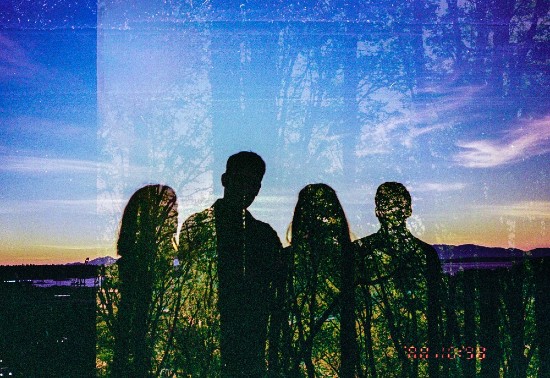
Earlier this fall, the self-titled LP from Seattle’s somesurprises hit record stores and digital services around the country. somesurprises began as the solo project of Natasha El-Sergany and has gradually begun involving other musicians; the result is a group that creates textured, haunting music that clicks on multiple levels. Following a fall tour, I talked with El-Sergany about the creation of the band’s new album, their time on the road, and more.
In interviews, you’ve spoken about the current state of Seattle. Would you say that it’s had any impact on the music that you make?
Not really, although probably in a subtle way you feel the impact of everything changing around you, getting built up and rent going up, prompting all your friends to decide it would be just as affordable to live in New York or somewhere with more sun, more access to opportunities. High Rise is not really about Seattle, but if I had a big budget, I’d want to make a music video with the mechanical pulse of the song set to the construction of a skyscraper. There’s something sinister about things getting visually bigger or better while also getting worse for people on the ground, and we’re definitely in that moment.
somesurprises began as a solo project and has expanded from there. To what extent did that shift affect the new full- length?
We are bad at taking band photos since whenever our schedules line up, that’s the time we try to play, but there are usually 4 of us (sometimes 5, one time, 7!) playing together. Having a solid rhythm section is everything, and expands the possibilities from just walking around in a comfort zone of making kind of spacy folk music into having an actual engine and being able to travel and get to new places. Writing together is a rewarding process and I think the record is ultimately a document of many group decisions, spoken and unspoken. Recording in a much more professional setting with Paurl Walsh allowed us to work on overdubs and harmonies, which was a first, and made a huge difference in enabling us to try out different ideas, and come out with sounds that a lo-fi setting may not allow.
The self-titled album also comes with a cassette available via Bandcamp. How do you view these two works as relating to one another?
The little cassette that comes with the album was Jeff Kuykendall’s idea – he asked if we had any unreleased material floating around to throw on as a bonus to the album, and it so happened that Josh and I had recorded these three songs together. I got to play some piano and bass, and Josh and I sing together on a track. The songs were recorded in a completely new context (well, a different basement studio), separate from the album, which felt good—like, even after an enormous project that seems endless, it can get done, and there can still be more to do.
You’re newly back from tour — how did that end up going?
We’re rich and famous now! No, but tour was really, really, really fun. The weather was perfect and we missed all the California fires by about 12 hours. Nico got a gnarly case of “sand toe” while running into the ocean at Torrey Pines. Laura mapped out all the Costcos on the route so we could save money on gas (and get that sweet froyo). We stayed in a really fancy but funny hotel in San Diego with bathrooms that had no doors. We camped out in a cabin in Northern California where I think I got the best night of sleep in my life. Our LA show at Human Resources was maybe my favorite – the two acts we played with were vocal-only a cappella singers who lulled the room into a daze. There was no mood lighting so we were in stark IKEA-like conditions playing for quiet and attentive people, but somehow the vibe was completely warm. A Portland four-band bill was also a highlight – Mini Blinds, Palm Crest, and Ancient Pools all swept me away. At Olympia we played at the gothiest bar—an embalming table as you walk in, ominous red lighting. And playing a couple shows with our friends in Night Collectors in the Bay area was a total treat. Man, that was so much fun.
In your interview with Bandcamp, you mentioned that your day job had begun to influence the music that you make. What was the experience of making that decision like?
Honestly, it’s not even really true. I think Bandcamp maybe pulled that answer out of me because I think the more boring answer is that my music has nothing to do with my job. But I appreciate any opportunity to get people to think critically about how messed up the immigration system is and our roles within it.
What would you say is next for somesurprises?
After money and fame, what is there? Just kidding. But hopefully new music, new tours, the cycle of building and tearing down over and over forever. In the immediate future, I would like to get an old mac desktop and teach myself how to record on something other than my phone.
Follow Vol. 1 Brooklyn on Twitter, Facebook, and sign up for our mailing list.
